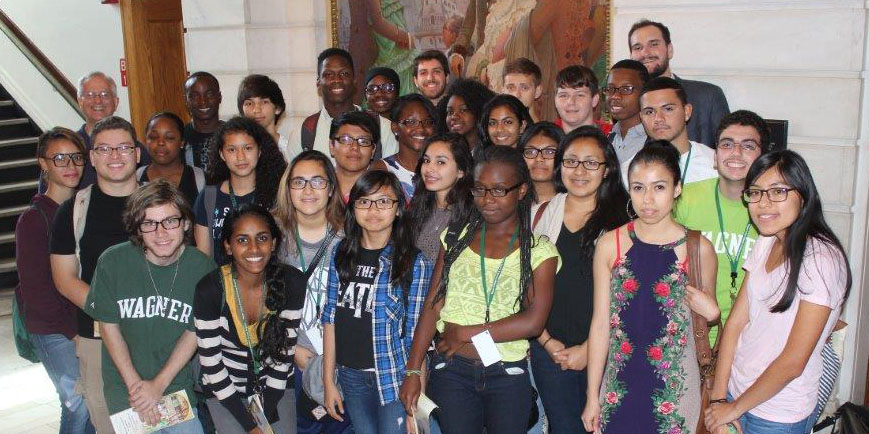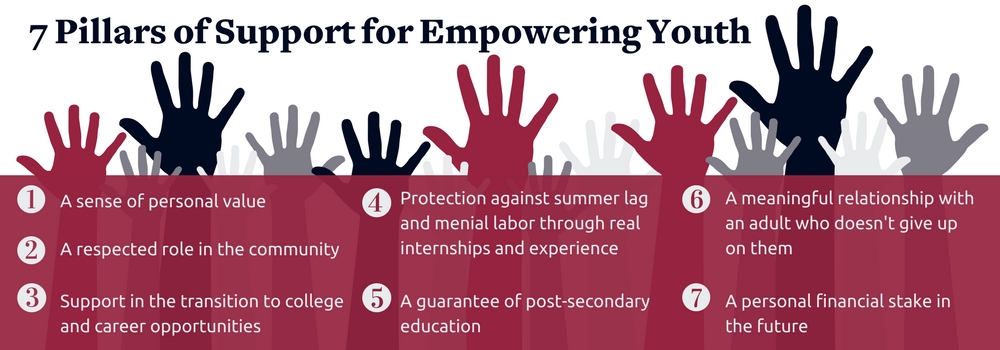Investing in Youth to Strengthen and Sustain Local Communities
Imagine a future where youth in underserved communities are engaged as local problem solvers to play an active role in their own community’s advancement.
The Civic Opportunities Initiative Network (COIN) does exactly that.
A national leadership and community development program operating at the high school and college level in struggling communities across the United States, COIN’s distinct approach builds on the potential of emerging young leaders to cultivate active participation in community life through leadership training, educational enrichment work, wellness development, guaranteed college access, one-to-one mentorship, and long-term civic engagement.
We work in close partnership with local universities, government agencies, and community based organizations to provide a consistent, sustained program that’s adaptive to the particulars of local challenges and opportunities by leveraging local assets, resources, capacity and infrastructure to build a community focused agenda “in place.”
Whereas other scholarship programs operate under a deficit model that looks at what poverty does to a person, COIN shifts the perspective to explore the recognizable pillars of support experienced by middle-class families that can be applied to the successful education and mobility of low-income young adults.
We believe that prioritizing the advancement of young people, historically and currently left behind, while linking that progress to community development, is key to reclaiming community and expanding the middle class.
Expanding Educational Opportunity & Building Community
The COIN Scholars Pilot Cohort was an experimentation project launched in 2011, with the New World Foundation working in close partnership with community-based organizations in Florida, California, New Mexico, New York, and Virginia to identify 21 disadvantaged high school graduates to accompany the students through their 4-year college experience.
We provided sustained financial support, mentorship, opportunities to connect with other students, paid internship experience, political education, and implementation of reflective practice tools to serve a long-term vision that increased the students’ chances of graduating, becoming civically engaged, and committing to the development of their local communities.
The results proved the COIN experiment successful, and led us to build a series of programs that invest in related and derivative pilot projects adaptive to the particulars of local challenges and opportunities, all of which highlight the significance of the pillars we identified. Here are some of the COIN models operating nationally:
COIN National Organization Model:
The Posse Civic Engagement Program
The Posse Foundation | Miami, FL
Working in partnership with the Posse Foundation, a national college access and youth leadership development institute, we created a Civic Engagement Posse Program to support students interested in exploring careers in social justice and public service throughout the local chapters. It features a curriculum designed to foster community action and build civic awareness and social responsibility along with summer internships at institutions and organizations that work to address societal inequities and create positive, lasting change.
COIN Undergraduate Model:
The New World Fellows Program
Skidmore College | Saratoga Springs, NY
The New World Fellows Program provided stipends for fifteen low-income Skidmore students to study social issues and policy development through community-based advocacy work each year. Beginning in the summer of Freshman or Sophomore year in college, students commited to a 9-week, full-time community-based field placement in a non-profit or government agency in their home community. Complementary academic and policy training was provided by the Roosevelt Institute Campus Network through work study placement in the student’s college or university community when they returned to campus, and a “Social Justice Seminar” in the fall that provided college credit to study issues relevant to their institutional placements, including needs assessment, grant writing, and policy analysis.
COIN Community-Based Organization Model:
Dream Summer
UCLA Labor Center | Los Angeles, CA
Dream Summer at the UCLA Labor Center empowers immigrant youth across the country to be the next generation of social justice leaders through a paid summer internship program that places immigrant youth in local social justice organizations for 10 weeks, working closely with their host organization to strengthen the inclusion of undocumented immigrant issues into the organization’s ongoing mission and vision. The program creates safe and healing spaces for immigrant youth to connect with each other and explore their identities; and promotes an intersectional, cross-racial, and multi-generational approach to social justice that addresses the needs of immigrant communities.
COIN Local Network Model:
The Port Richmond Partnership Leadership Academy
Wagner College | Staten Island, NY
The Port Richmond Leadership Academy is a three-year commitment with a five-week summer intensive program provided by a partnership between Wagner College, the Port Richmond High School, and a number of community-based organizations, government agencies, and academic and social justice practitioners. The program aims to enhance and enrich the advancement of Port Richmond High School rising juniors and seniors, and future college first-year students. The Academy is a truly unique program designed to deepen participants’ academic abilities as well as develop community capacity building skills to affect positive change locally. Academy participants are provided guaranteed college scholarships to Wagner College and partnering colleges and universities for all students that complete the program. The students are immersed in two innovative, credit-bearing high school or college courses during the summer intensive, in addition to completing a focused community advocacy project or internships and engaging in civic learning field trips throughout the summer and academic year.



